|
Here are all the paintings of LANCRET, Nicolas 01
| ID |
Painting |
Oil Pantings, Sorted from A to Z |
Painting Description |
| 64724 |
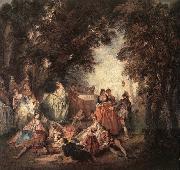 |
Company in the Park |
64,5 x 69,5 cm Museu Calouste Gulbenkian, Lisbon Artist:LANCRET, Nicolas Title: Company in the Park, 1701-1750, French , painting , genre |
| 7795 |
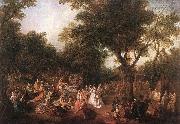 |
Company in the Park g |
Oil on canvas, 64,5 x 69,5 cm
Museu Calouste Gulbenkian, Lisbon |
| 7796 |
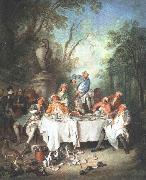 |
Fete in a Wood s |
1720-25
Oil on canvas, 64 x 91 cm
Wallace Collection, London |
| 64726 |
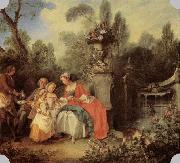 |
Lady and Gentleman with two Girls and a Servant |
1742 Oil on canvas, 89 x 98 cm National Gallery, London Artist:LANCRET, Nicolas Title: Lady and Gentleman with two Girls and a Servant, 1701-1750, French , painting , genre |
| 7798 |
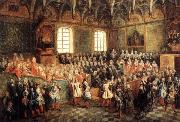 |
Lady and Gentleman with two Girls and a Servant sf |
1742
Oil on canvas, 89 x 98 cm
National Gallery, London |
| 7797 |
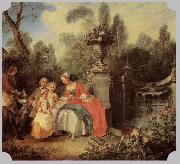 |
Luncheon Party sg |
1735
Oil on canvas
Museum of Fine Arts, Boston |
| 7794 |
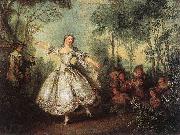 |
Mademoiselle de Camargo Dancing g |
1730
Oil on canvas, 42 x 55 cm
Wallace Collection, London |
| 30605 |
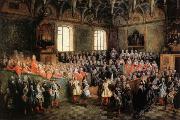 |
Solemn Session of the Parliament for KingLouis XIV,February 22.1723 |
mk68
Oil on canvas
Paris,Louvre
c.1723
France |
| 7793 |
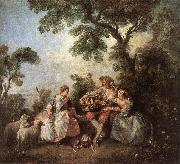 |
The Bird Cage s |
Oil on canvas, 44 x 48 cm
Alte Pinakothek, Munich |
| 29636 |
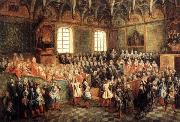 |
The Seat of Justice in the Parliament of Paris in 1723 |
c. 1724
Oil on canvas, 56 x 81,5 cm |
| 7799 |
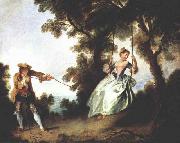 |
The Seat of Justice in the Parliament of Paris in 1723 g |
c. 1724
Oil on canvas, 56 x 81,5 cm
Mus??e du Louvre, Paris
|
| 7800 |
 |
The Swing t |
Oil on canvas
Victoria and Albert Museum, London |
| 7801 |
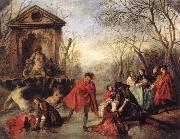 |
Winter g |
1738
Oil on canvas, 69 x 89 cm
Mus??e du Louvre, Paris |
|
|
| LANCRET, Nicolas
|
| French painter (b. 1690, Paris, d. 1743, Paris).
French painter, draughtsman and collector. He was one of the most prolific and imaginative genre painters of the first half of the 18th century in France, and, although after his death he was long regarded as a follower and imitator of Antoine Watteau, his work is markedly personal and often innovative. He began training as an engraver but soon apprenticed himself to Pierre Dulin (1669-1748), a moderately successful history painter; by 1708 he had enrolled as a student at the Academie Royale de Peinture et de Sculpture, Paris. At an unknown date he entered the workshop of the genre and decorative painter Claude Gillot, who had been Watteau's master. This move signalled an important change of direction away from the history painting pursued by his friend Francois Lemoyne. Two contemporary biographers, Ballot de Sovot and D?zallier D'Argenville
|
|

